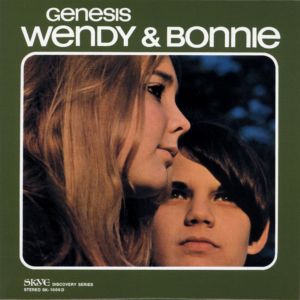
- Format: MP3

Japan 24-Bit Remaster
Genesis, the sole album by SF-based sisters Wendy and Bonnie Flower, ranks as one of the most remarkable unheard albums of 1969. With melodic confections laced with radiant sisterly harmony, the breezy Brazilian splashes and soft-rock strains of Genesis convey a sophistication that belies the artists' tender ages (Wendy 17, Bonnie 13). Produced for reissue by Irwin Chusid (author of "Songs In The Key Of Z: The Curious Universe Of Outsider Music") with Wendy & Bonnie's full participation, Genesis makes its long-awaited official.
It's hard to remember a time when "teen pop" wasn't brain-dead. The genre has always been filled with ham-fisted emotional statements and triple-sanded pop hooks. And even though these are especially dire times for teen-oriented music, it's not like the Bay City Rollers or Frankie Avalon ever succeeded in making big statements to their generation--or even anything worth humming many years hence.
But what about the other kind of "teen pop"--the kind that's made by teenagers instead of for them? Buddy Holly was only nineteen when he began his recording career; Tommy Bolin had made two albums with Zephyr by the time he turned 20. And certainly, in every town in America, there was at least one band of high-school kids writing original songs and daring to dream big. Most of them were as bad as Johnny Bravo, though, and they're best left in the past.
Then again, San Francisco in the mid-60s was a different place, maybe the only place in America with a fully cross-pollinated music scene. Wendy and Bonnie Flower (their real names, believe it or not) were fortunate enough to grow up there at that time, and to have connections to Cal Tjader, the foremost non-Latino in the Latin jazz movement. Tjader helped the sisters land a record contract; in 1968, they dove into the studio with some of LA's top session musicians and recorded their Genesis album.
The album went nowhere upon its 1969 release; their record label tanked, their producer died, and Wendy and Bonnie might have vanished into history with all the other garage bands. But a few copies of Genesis fell into the right hands, giving the album a lasting underground buzz. For most of the 80s and 90s, it was an album more often talked about than heard, acquiring a near-legendary status among fans of 60s psychedelic pop.
Listening to Genesis is a walk backwards to the late 60s. Sonically, the album is sort of a folk/lounge/Debussy mashup whose most distinguishing characteristic is the powerful blend of Wendy and Bonnie's voices. The session players (aces like Jim Keltner, Larry Carlton, and Michael Melvoin) try their best to keep the sound out of the coffeehouse, but Wendy's songs simply reek of caffeine and study hall. There's a melodic and harmonic sophistication that one might not expect from a teenage songwriter, but it's clear that Wendy's stylistic horizons were somewhat limited. (Although the sisters' penchant for suddenly breaking into madrigal-type singing in the middle of folk-pop songs is certainly intriguing.)